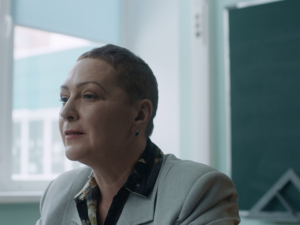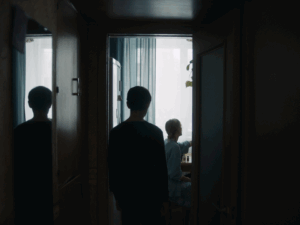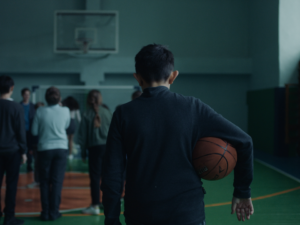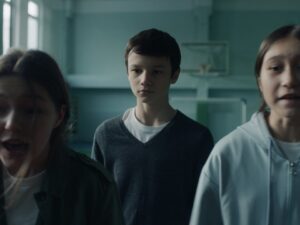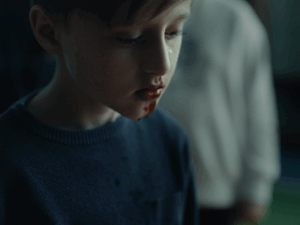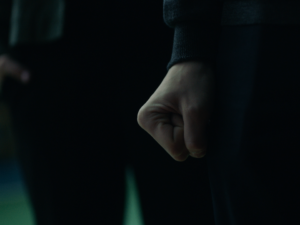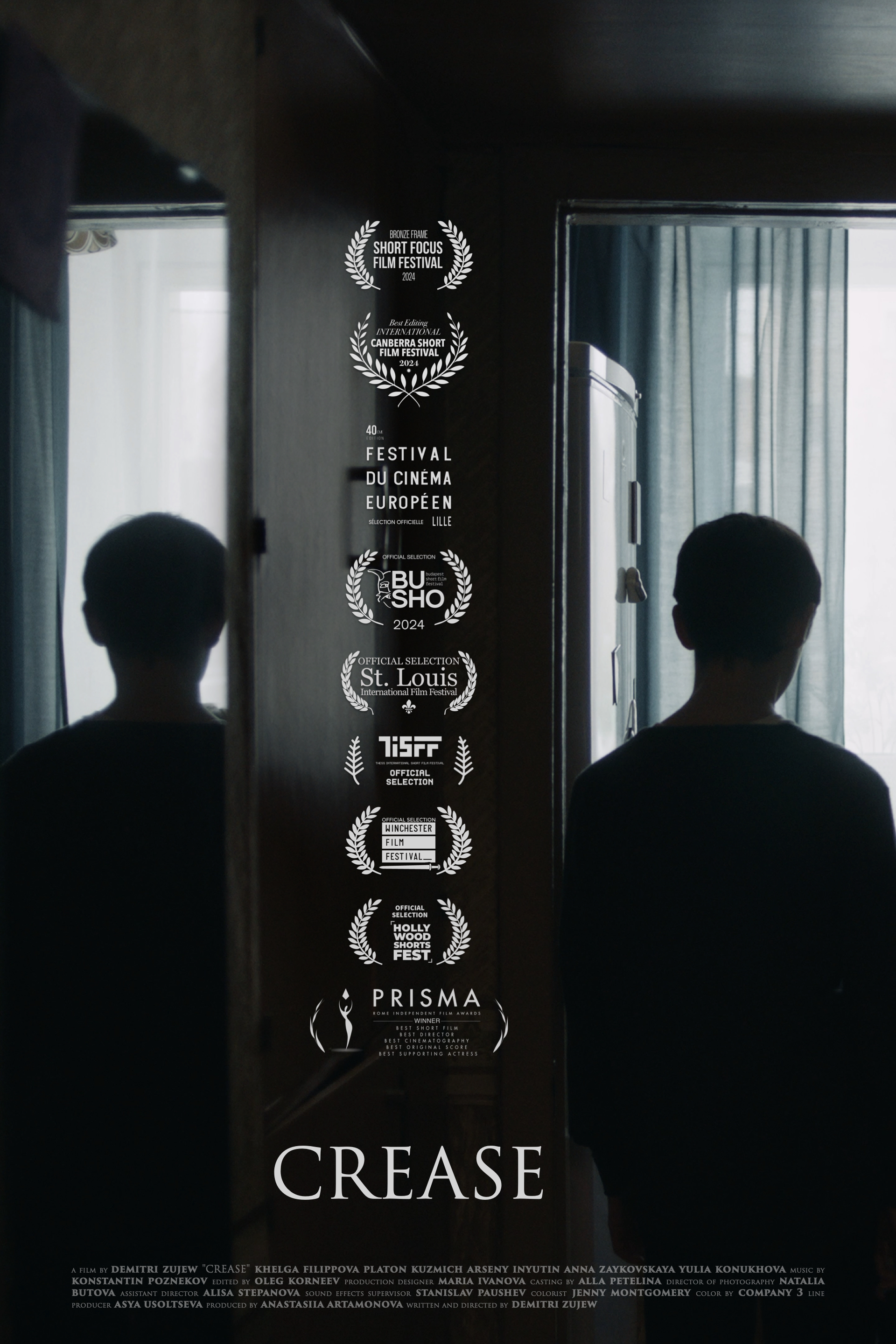
Short Film Review “Crease”
NO TRAILER CURRENTLY AVAILABLE
WATCH THE FILM BELOW:
First, the Recap:
Under the gun. There is an actuality to the concept of peer pressure that is utterly undeniable. Our innate desire to please others is a valid yet challenging, plus sometimes debilitating, facet of who we are as we venture to establish the identity by which we’re known. The dilemma of having to face moments of choice driven more forcibly by others around us and subsequently finding ourselves at a personal crossroads, DO we move forward under the weight of expectations, even when the expectations and voices involved are misguided in purpose?
Even as Nina (Khelga Filippova), the principal of a local school, conducts an interview where she lauds the institution’s success rates and overall healthy atmosphere across the board, a student named Max (Platon Kuzmich) uncomfortably finds himself at the center of his friend Igor’s (Dmitrii Bashniak) unfolding plan with another group of students to torment one of the school’s perceived “outcasts”, Petya (Arseny Inyutin). Connected far more than he lets on, will Max choose rightly, or fall prey to other kid’s “mob rule” mentality?
Next, my Mind:
A raw portrait showcasing harrowing crisis of conscious colliding with the upheavals created by others who believe they have a right to “prey” upon those considered weaker or less worthy of respect, support, or even basic empathy, this jarring and potently impactful 20-minute short film from writer/director/editor Demitri Zujew and producer Anastasiia Artamonova hits a sadly necessary chord within you as a viewer thanks to the realities it demonstrates in regard to the concepts of youth, socialization, and prejudices against disability, social impairment, or possessing exceptional intelligence, here addressing it ALL. While not founded directly on any true events, the sheer fact that there IS such volatility and malice amongst young people, really ALL of humanity in this day and age unfortunately, it’s a story that packs a definitive punch, speaking frankly and with unrelenting purpose to us and the things that genuinely need to CHANGE.
Amidst a constant battling for their own sense of acceptance and/or “worth” within a self-made “hierarchy”, the narrative follows a student forced into a harsh, highly personal situation and sphere of troubling influence even as his school’s principal is doing a press interview about the institution’s positive merits and sterling reputation. The weight of everything portrayed is palpable, in distinctly clashing forms, from the start, not letting up one degree as the narrative unfolds so as to ensure the FULL magnitude of revelations unveiled is felt with utterly compelling, evocative, and most definitely persuasive force. For this critic, the project is, as hinted at above, one of those requisite, awareness-raising efforts that makes its points, even if by general conjecture, and SHOULD cause us to take heed about what is potentially happening with our youth and our schools, accountability being a MUST for leadership who could be unintentionally oblivious.
It’s this dichotomy in the delivery of messaging from the school’s head vs. the distorted ideas of the students perpetrating the torment of a classmate that allows for the unsettled nature of the story to hit home with the aforementioned tension. But, there is then the added layer of watching one student’s desperate struggle to be acknowledged and approved by his peers while knowing what he’s involved with is NOT at all right, which subsequently gets taken to yet ANOTHER level when a certain truth gets uncovered and his entire mentality is being shaken, in spite of a surface-only sense of apathetic rebellion. It is simply SO overtly opposite from the believable positivity being exuded from the school principal during her interview while the actual incident is taking place effectively right under her nose that likewise strikes you deeply, your emotions all over the board given the contrasting circumstances we witness.
Understand that this is all a testament to the excellence in artistry and execution Zujew and Co. have manifested through their film. The manner in which the film ultimately comes to its end REALLY cements the notions and thematic gists in your brain while once again causing a multitude of emotions to arise. It’s a study of human nature, the perceptions we choose to embrace or remain ignorant about the actuality of, taking responsibility for ourselves and those who are (or are supposed to be) in our care, self-worth, anger within fused by others or our own discontent, and the trials of growing up and wanting to be a part of the whole (but at what cost?). These themes are addressed in some way as the story is presented and remain wholly relevant topics of both discussion and debate alike. The exploration of these through the means by which this film chooses solidifies the verity of what should simply be our desire to IMPROVE for the BETTER.
Filippova elicits a sense of both empathy and even a certain extent of enmity here through her role as Nina, the principal of a school that she is more than proud of thanks to actions and policies she’s initiated that have brought them acclaim–and a chance for her to toot her own figurative horn through an interview being conducted by the local news station. Laying it on thick as to her–well, the school’s, right?–achievements and wishing only to show a positive track record, Nina remains unaware that events are taking place at the same time which would contradict much of what she’s stated doesn’t occur there. It’s a totally credible, understated but focused and purposeful performance that Filippova provides, once more causing you to love and hate her character at the same time given the grander scope of things happening.
Kuzmich stands out, as so many of the young actors I’ve seen in films over the last many years, with a maturity in performance that I feel belies his age. This talent is on full display through his role as Max, a student at the school whom we believe is one who only wants to be a part of the crowd, to discover that acceptance, and keep moving forward. However, when his apparent “best friend” draws him into helping torment one of the school’s socially awkward, highly intelligent, but also impaired students, Max gets an encounter with all the restless thoughts about how he feels being dragged into it and pressured to participate. Whether he does and what the ramifications are of his choice plays out with stirring but also startling results, and the quiet yet fiery energy and demeanor Kuzmich infuses into Max’s character and his plight is beautifully noteworthy in how it resonates with you as the viewer.
Inyutin is a picture of heartbreaking vulnerability and unfeigned innocence stolen and abused through his role as Petya, a student gifted with an amazing mind but stunted social skills and at least a partial disability that makes him the target of ridicule and bullying by his classmates. On this day where the school is being praised by the principal, Petya is running away from a host of other kids literally chasing him down in order to catch and mistreat him, which sadly they do. In the process, one particular student has Petya’s attention, only observing the nastiness until taking part in a sorrowful instance of physical violence. How Petya comes out of this episode is just painfully hard to take in, much less further truths that get outed in the aftermath that only make the issue worse, and Inyutin does an amazing job of embodying a boy’s misery with undeniable poise and an aching degree of realistic emotive poignancy that melts your soul.
Primary supporting roles come first through Bashniak as Igor, Max’s supposed best friend who appears only interested in helping orchestrate and dish out the trauma to others while also pulling Max involuntarily into it all. Anna Zaykovskaya is the visiting journalist getting her story for the local news about Nina’s school and the award-winning efforts and notoriety it has managed to cultivate, which isn’t as clear-cut as it seems. Yulia Konukhova plays Max’s mother who has more than her fair share to say to Max once finding out about the day’s events in the way she does. Valentina Nikitina is one of the teachers at the school who honestly seems to be a “cheerleader” for Nina’s mostly self-serving actions and requests, even if still appreciated for her own contributions by her boss. Oleg Ten appears as the cameraman for the interview.
So, in total, “Crease” stands as a well-conceived, adeptly fashioned, convincingly powerful short film that carries out its theories on behavioral conditioning, the consequences of actions taken, and “what lies beneath the surface” abstractions with straightforward logic and dramatic prowess, making it a film this critic hopes MANY people will see, contemplate, and recognize the urgency of the statements made about our current world and the condition of all of us in it.
STAR RATING (out of 5):
As always, this is all for your consideration and comment. Until next time, thank you for reading!
